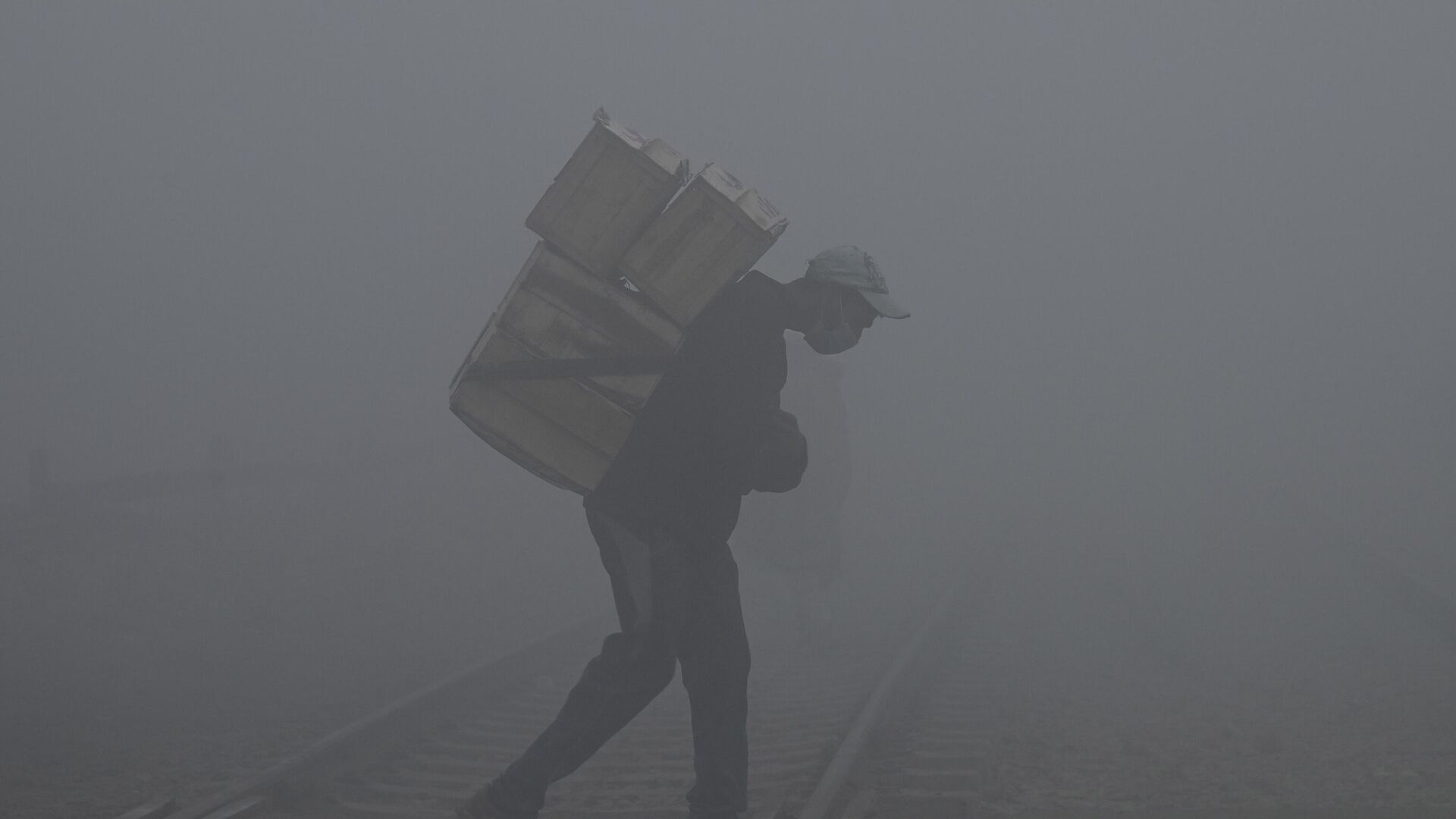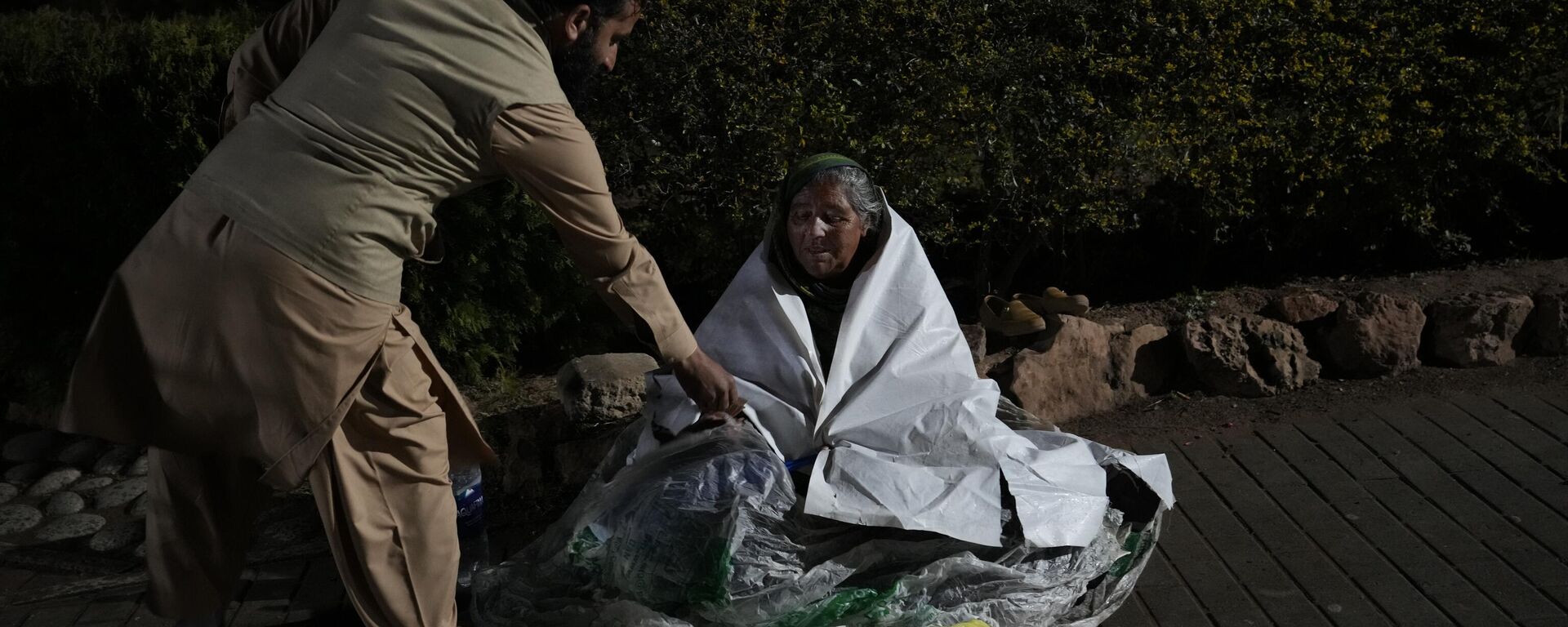https://sputniknews.in/20230313/pakistan-formulates-first-clean-air-policy-to-fight-pollution-1147965.html
Pakistan Formulates First 'Clean Air Policy' to Fight Pollution
Pakistan Formulates First 'Clean Air Policy' to Fight Pollution
Sputnik India
Air pollution is one of the greatest public health risks in Pakistan, killing an estimated 128,000 people every year. The recently approved NCAP policy now... 13.03.2023, Sputnik India
2023-03-13T18:42+0530
2023-03-13T18:42+0530
2023-03-13T18:42+0530
pakistan
environment
south asia
climate change
air pollution
https://cdn1.img.sputniknews.in/img/07e7/03/0d/1149731_0:160:3073:1888_1920x0_80_0_0_0866a0617bb30785172ccd63ed72b2f1.jpg
Pakistan's cabinet approved the country's first National Clean Air Policy (NCAP) last week following recommendations from the Ministry of Climate Change.According to the Minister for Climate Change Sherry Rehman, the policy aims to provide a framework for improving air quality, identifying priority interventions in transport, industry, agriculture, waste, and residential sectors and recommending five key mitigation actions for each one.Many of NCAP's proposals look to improve on the application of already-existing measures in the country, including developing regulations and standards in order to monitor factories and industries; providing adequate funding and financial incentives to make less polluting technologies and practices affordable; and appealing to farmers, industries, waste management companies, and households.The need for a clean air policy was identified by Pakistan’s Nationally Determined Contributions (NDC) in 2021. Although the NCAP will provide a guideline to achieve cleaner air, the implementation of the measures will ultimately depend on the provinces, which have had the opportunity to input to the policy over the last five months.Rehman explained that the new policy will be comprised of a national action committee, put together at the federal level and facilitated by a technical committee.The action committee will be responsible for updating the NCAP every five years, while the technical committee will look after the milestones of the policy and make relevant plans.The minister further added that the NCAP provides a non-binding roadmap for the provinces to follow and that the provincial governments, Azad Jammu and Kashmir, Gilgit Baltistan and local governments have also promised to devise their strategies, plans, and programs to apply the policy.The Fifth SeasonIf properly applied, the NCAP's guidelines may result in a reduction of deaths and transboundary pollution, improving the health of Pakistani citizens and having a positive impact on the country's overall economic activity.Pakistan ranks among the world's most polluted countries with cities like Lahore and Karachi particularly affected. The World Bank has estimated that air pollution has cost Pakistan a staggering $47.8 billion.It is a critical environmental and health issue causing the estimated death of 128,000 people a year, according to Fair Finance Asia-Pakistan.Moreover, toxic air reduces the average life expectancy of citizens by up to 4.5 years, according to recent research. In Pakistan, the entire population of 220 million resides in areas with annual average particulate levels higher than the World Health Organization's (WHO) guidelines.The country now faces a fifth season every winter from smog, with the air becoming so thick and dense that schools are shut down. Children have to remain inside and motorways are closed for safety due to low visibility in the country’s most populous cities.Despite the grim scenario, some researchers believe that if the right policies are implemented the situation can be reversed.Time for ActionThere is a chance for Pakistanis to gain between three to seven years of life in metropolitan cities if the most health-damaging particulate air pollutant (PM2.5) concentrations are reduced to WHO guideline's of 5µg/m3 — the concentration of an air pollutant per cubic meter of air, one research suggests.NCAP's proposals are projected to reduce the most health-damaging particulate matter air pollution by 38% by 2030. As Syeda Hadika Jamshaid, a climate change expert from Pakistan, suggests, "There is a need for the government to continue to utilize the momentum created by this (NCAP) assessment and adopt an integrated emissions inventory to enable policymakers to take stock of the progress toward the clean air policy targets."
https://sputniknews.in/20230221/imf-friendly-countries-cannot-solve-pakistans-problems-defense-minister-948781.html
pakistan
south asia
Sputnik India
feedback.hindi@sputniknews.com
+74956456601
MIA „Rossiya Segodnya“
2023
Aneela Rashid
https://cdn1.img.sputniknews.in/img/07e6/0c/0d/74548_0:0:485:484_100x100_80_0_0_821526e967ae85d041e2d30ee34fa1de.jpg
Aneela Rashid
https://cdn1.img.sputniknews.in/img/07e6/0c/0d/74548_0:0:485:484_100x100_80_0_0_821526e967ae85d041e2d30ee34fa1de.jpg
News
en_IN
Sputnik India
feedback.hindi@sputniknews.com
+74956456601
MIA „Rossiya Segodnya“
Sputnik India
feedback.hindi@sputniknews.com
+74956456601
MIA „Rossiya Segodnya“
Aneela Rashid
https://cdn1.img.sputniknews.in/img/07e6/0c/0d/74548_0:0:485:484_100x100_80_0_0_821526e967ae85d041e2d30ee34fa1de.jpg
pakistan, environment, south asia, climate change, air pollution
pakistan, environment, south asia, climate change, air pollution
Pakistan Formulates First 'Clean Air Policy' to Fight Pollution
Air pollution is one of the greatest public health risks in Pakistan, killing an estimated 128,000 people every year. The recently approved NCAP policy now looks to spur the provinces into action to fight this.
Pakistan's cabinet approved the country's first National Clean Air Policy (NCAP) last week following recommendations from the Ministry of Climate Change.
According to the Minister for Climate Change Sherry Rehman, the policy aims to provide a framework for improving air quality, identifying priority interventions in transport, industry, agriculture, waste, and residential sectors and recommending five key mitigation actions for each one.
Many of NCAP's proposals look to improve on the application of already-existing measures in the country, including developing regulations and standards in order to monitor factories and industries; providing adequate funding and financial incentives to make less polluting technologies and practices affordable; and appealing to farmers, industries, waste management companies, and households.
The need for a clean air policy was identified by Pakistan’s
Nationally Determined Contributions (NDC) in 2021.
Although the NCAP will provide a guideline to achieve cleaner air, the implementation of the measures will ultimately depend on the provinces, which have had the opportunity to input to the policy over the last five months.
"It is a policy guideline for the implementing agencies and environmental protection agencies (EPAs) in all the provinces and federal units," Minister Rehman said in a statement on Friday.
Rehman explained that the new policy will be comprised of a national action committee, put together at the federal level and facilitated by a technical committee.
The action committee will be responsible for updating the NCAP every five years, while the technical committee will look after the milestones of the policy and make relevant plans.
The minister further added that the NCAP provides a non-binding roadmap for the provinces to follow and that the provincial governments, Azad Jammu and Kashmir, Gilgit Baltistan and local governments have also promised to devise their strategies, plans, and programs to apply the policy.
"It is only through the collective and collaborative efforts that we can deliver on this policy and improve Pakistan's air quality, reducing air pollution that harms millions of Pakistanis every year," the minister said.
If properly applied, the NCAP's guidelines may result in a reduction of deaths and transboundary pollution, improving the health of Pakistani citizens and having a positive impact on the country's overall economic activity.
Pakistan ranks among the world's most polluted countries with cities like Lahore and Karachi particularly affected. The World Bank has estimated that air pollution has cost Pakistan a staggering $47.8 billion.
It is a critical environmental and health issue causing the estimated death of 128,000 people a year, according to
Fair Finance Asia-Pakistan.
Moreover, toxic air reduces the average life expectancy of citizens by up to 4.5 years, according to recent research. In Pakistan, the entire population of 220 million resides in areas with annual average particulate levels higher than the World Health Organization's (WHO) guidelines.
The country now faces a fifth season every winter from smog, with the air becoming so thick and dense that schools are shut down. Children have to remain inside and motorways are closed for safety due to low visibility in the country’s most populous cities.
Despite the grim scenario, some researchers believe that if the right policies are implemented the situation can be reversed.
There is a chance for Pakistanis to gain between three to seven years of life in metropolitan cities if the most health-damaging particulate air pollutant (PM2.5) concentrations are reduced to WHO guideline's of 5µg/m3 — the concentration of an air pollutant per cubic meter of air, one
research suggests.
NCAP's proposals are projected to reduce the most health-damaging particulate matter air pollution by 38% by 2030.
As Syeda Hadika Jamshaid, a climate change expert from Pakistan, suggests, "There is a need for the government to continue to utilize the momentum created by this (NCAP) assessment and adopt an integrated emissions inventory to enable policymakers to take stock of the progress toward the clean air policy targets."



